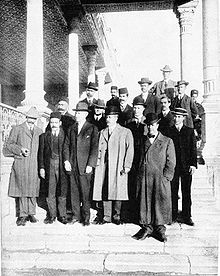- William Morgan Shuster
-
William Morgan Shuster (23 February 1877 in Washington, D.C. – 26 May 1960 in New York City), American lawyer, civil servant, and publisher, who is best known as the treasurer-general of Persia by appointment of the Iranian parliament, or Majles, from May to December 1911.
Contents
Background
Shuster was born in Washington, DC and educated in the Columbian University and Law School. After graduation, Shuster who became a customs collector for the U.S. government, serving in Cuba in 1899 following the Spanish American War, and in the Philippines, which was at that time an American colony.
In Persia
In 1906, the Constitutional Revolution of Iran sought to establish a Western-oriented, democratic civil society in Persia. The movement forced the Shah to agree to the election of the first Majlis, the opening up of a relatively free press, and a number of other reforms.
After being recommended by the U.S. government to the Iranian minister in Washington, Shuster was appointed by the Majlis to help manage the country's financial position. Persia was on shaky financial footing at the time due to heavy debts accumulated by the Qajars, the Persian royal family, to the two colonial powers of Great Britain and Russia in Iran. Great Britain and Russia had previously carved up Persia into two spheres of influence pursuant to the Anglo-Russian Convention of 1907.
Shuster became active in supporting the Constitutional revolution of Persia financially.[1] When Iran's government ordered Shu'a al-Saltaneh (شعاع السلطنه), the Shah's brother, who was aligned with the goals of Imperial Russia in Persia, to surrender his assets to the government, Shuster was assigned this task, which he promptly moved to execute. Imperial Russia immediately landed troops in Bandar Anzali demanding a recourse and apology from the Persian government.
The hiring of Shuster and his American associates as financial advisors concerned the imperial powers, who sought to keep Persia from independent influences and dampen national feeling.
Under Russian and British pressure, the vice-regent of Persia expelled Shuster from office in December 1911 against the will of the Persian parliament. Shortly thereafter, due to the chaotic political climate created by Shuster's ouster, the deposed Shah, Mohammad Ali Shah Qajar attempted an invasion of Persia.
- The Majlis approved (Shuster's) financial powers. Shortly after his arrival the Russian government demanded his expulsion, and when the Majlis refused to do so, Russia occupied northern parts of Iran. The Majlis was suspended, and no budget law was prepared for a number of years.[2]
hence eventually, Iran's parliament in Tehran was shelled by General Liakhoff of Imperial Russia, and the American Morgan Shuster was forced to resign under tremendous British and Russian pressures. Shuster's book "The Strangling of Persia" is a recount of the details of these events, a harsh criticism of Britain and Imperial Russia.
The Strangling of Persia
Shuster returned to the United States and wrote a scathing indictment of Russian and British meddling in the affairs of Persia, titled The Strangling of Persia. In one well-known passage of that book, Shuster decried the influence of the Great Powers:
- [I]t was obvious that the people of Persia deserve much better than what they are getting, that they wanted us to succeed, but it was the British and the Russians who were determined not to let us succeed.
The Strangling of Persia, which has been dedicated to "The Persian People", was originally published in New York by the Century Company in 1912, then reprinted by the Greenwood Press in 1968 and Mage Publishers in 1987 and 2005. The book was subtitled, the story of the European diplomacy and oriental intrigue that resulted in the denationalization of twelve million Mohammedans, a personal narrative.[3] The dedication of the book reads thus:
- TO THE PERSIAN PEOPLE
In the endeavour to repay in some slight measure the debt of gratitude imposed on me through their confidence in my purposes towards them and by their unwavering belief, under difficult and forbidding circumstances, in my desire to serve them for the regeneration of their nation, this book is dedicated by the author.
The book's motto is:
- "Time with whose passage certain pains abate
- But sharpens those of Persia's unjust fate."
Shuster's book is an invaluable eyewitness account of a weak developing nation that is falling prey to the ambitious imperial expansionism of Great Britain and Russia. The central theme is the tenacity with which he applies himself to the task of creating a viable administrative apparatus to collect taxes, the sine qua non of creating a nationalist government capable of resisting imperialism. For this very reason, Shuster and his administrative assistants were the direct targets of the Russian invasion of the country in 1911-1912: Shuster's removal from his position at the Treasury was a principal objective of Russian foreign policy. The details of the struggle for power in Tehran are written in a robust, straightforward style.
Chapter XI of the Strangling of Persia provides a detailed appraisal of the state of tax collection in Persia, from payment-in-kind to tax farming. The interaction between foreign policy and taxation is particularly well done: rural landowners who didn't like paying their taxes were all too willing to ally with the Russian invaders.
The book is also remarkable because of Shuster's steadfast belief that he was working for a "Muhammedan" democracy. The constitution of 1906 had many similarities to Iran's constitution today, including judicial review by the clergy. But Shuster is unfailing in his assertion that he is working for a genuine democracy that is being overthrown by foreign imperial powers.
Life upon Shuster's return to the U.S.
Shuster entered publishing upon his return to the U.S. and became president of Century Publishing in New York. He led the firm, which had been established in 1870, through a merger with Appleton in 1933 and Crofts in 1947. By his death in 1960 the firm was known as Century-Appleton-Crofts. His daughter, Miss Carolyn Shuster, made front page news in the New York Times by attempting to elope, at age 17, with William Redding Morris, then 18. Though the elopement was at first foiled, the couple married a short while later over Shuster's objections.[4]
References
- ^ See p.83 of:
- بررسی مناسبات ايران و آمريکا 1925 ميلادی -1851. سيدعلی موجانی. وزارت امورخارجه - دفتر مطالعات سياسی و بين المللی. چاپ اول : تهران 1375. موسسه چاپ و انتشارات وزارت امور خارجه
- ^ See: The Iran Virtual Library
- ^ The book is currently in print, ISBN 0-934211-06-X. It can also be freely downloaded from Internet Archive.
- ^ NYT, "Search Five Cities for Miss Shuster," 8 September 1922; NYT, "MISS SHUSTER WEDS DESPITE OBJECTION; Daughter of Century Company President Becomes the Bride of William Morris," 31 January 1923. NYT, "W. Morgan Shuster Dead at 83: led Appleton-Century-Crofts," 27 May 1960. Carolyn Shuster later married Rear Admiral Leon Jackson Manees by whom she had two children. She died 14 April 2010 at the age of 105 in Wilmington NC. http://www.wilkersonfuneralhome.com/print.php?op=print&id=823
Further reading
- W. Morgan Shuster, The Strangling of Persia, 1st edition, 3rd impression (T. Fisher Unwin, London, 1913).
Note: This book can be freely downloaded from Internet Archive. (Digitized by Microsoft Corporation, in collaboration with University of Toronto.)
See also
- U.S.-Iran relations
- History of Iran
- Famous Americans in Iran
- Persian Constitutional Revolution
- The Great Game
Categories:- American lawyers
- American writers
- American publishers (people)
- 1877 births
- 1960 deaths
Wikimedia Foundation. 2010.



